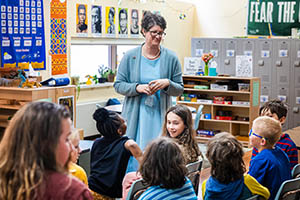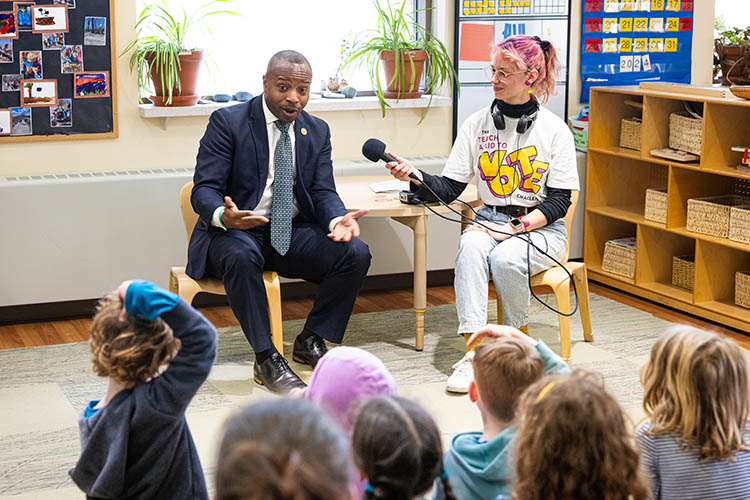How do you vote, and why should you vote?
Those are the questions that fellows in UW-Milwaukee’s Center for 21st Century Studies posed to two high-profile guests who visited the UWM Children’s Learning Center recently.
Milwaukee Mayor Cavalier Johnson and Jill Underly, the Wisconsin state superintendent of public instruction, stopped by the Children’s Learning Center on May 9 and spoke with students in the first-to-fifth grade class and 4- and 5-year-old kindergarten class. They were completing the “Teach a Kid to Vote” challenge, which is part of the Center for 21st Century Studies’ current Story Cart project, titled “Trust & the Vote.”

The C21 Story Cart is in its second year. For the project, C21 fellows pose a question to the Milwaukee community, centering around ideas about trust. With a mobile cart full of recording equipment, fellows can often be found throughout the city, conducting and recording interviews. Last year, C21 fellows interviewed city residents about issues surrounding trust and food.
This year’s project is about voting, said C21 fellow Jessica Thompson, who just graduated with her Master’s in Sustainable Peacebuilding.
“We ask nonpartisan questions about trust and awareness of the voting system,” she said. “Why do you trust or not trust the voting system? If you don’t trust it, what are the conditions that would encourage you to trust it more?”
In the classroom
The event started with Underly’s visit to a Learning Center classroom full of precocious 6- to 10-year-olds. The students listened while Underly answered the questions posed by story fellow Jacob Clements. She explained how to vote by outlining the process for registering to vote (you need a photo ID and proof of residence) and how to find your polling place. She described how to cast a ballot and turn it in to be counted.
As for why you should vote? “Because you live in a representative democracy and your voice is important. You select your leader so they can enact policies and create things to make your lives better,” Underly told her audience. “Part of participating in your community, in your democracy, is learning about the people who are going to represent you.”
Johnson spoke to a group of 5- and 6-year-olds and described the process of voting and why it is necessary, in terms friendly for small children. He used himself as an example.
“Voting is important. The reason I’m here as mayor is because people voted for me,” he said with a smile.
Both Johnson and Underly fielded some tough questions from their student audience, including: What if someone does not have a photo ID or a permanent address? What if someone does not have money to procure a driver’s license? Can children vote?
“Kids your age cannot vote. You’re learning to vote,” Johnson answered. “We’ve got so many people not just here in Milwaukee, but across the state, across the country, who can vote, and should vote, but don’t vote. So, I’m glad you guys are learning this right now. … All the learning you’re doing right now is going to prepare you for when it is time to vote.”
At the end of each challenge, Clements and Thompson, the C21 fellows, held their own polls: Had Underly and Johnson passed the challenge to Teach a Kid to Vote? The answer was a resounding yes. For their success, Underly and Johnson received stickers counting down the number of days until the next election.
Learning while they’re young
The Story Cart project overall is important in deepening awareness and inviting Milwaukeeans to have thoughtful conversations about issues in civic engagement. The Story Cart will be going out to engage voters of all ages in the Teach a Kid to Vote Challenge – sharing books on how and why to vote illustrated by the 5- and 6-year-olds at the Learning Center if they struggle to answer either question.
The collaboration with the young children, while playful, has another, deeper objective.
“Early childhood is the right time to start thinking about big ideas with children,” said Rona Wolfe, the UWM Learning Center’s assistant director of kindergarten and school-age programs. “And when we don’t, we miss opportunities to see children for who they are and what’s important to them, to know them as valuable members of communities and as change-makers.”
Underly agreed. Children are already learning the rudiments of voting, even if it’s just a teacher in a classroom taking a show of hands to see who wants to go outside for recess. These small bits of learning teach a bigger whole, like “understanding that they’re a part of a team, and cooperation and compromise, and making sure that we’re making the best decisions for ourselves as a group,” Underly said.
Some of the students are already starting to grasp those concepts. When asked why he thought it was important to vote, one student answered, “So a bad person doesn’t make bad rules. We need a good person who makes good rules.”
Though they have years to go until they can head to the polls, the students of the UWM Learning Center seemed eager to participate in the process. One kindergartener already had his ideal candidate in mind – the ice queen from the Disney movie “Frozen.”
“I’m going to vote for Elsa!” he proudly declared.
Thanks to Underly and Johnson, now he knows how to cast his ballot.






